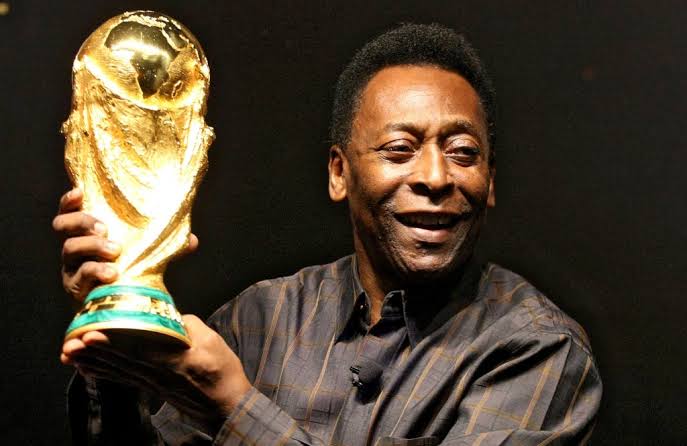Edson Arantes do Nascimento, better known to the world as Pelé and nicknamed by his admirers as O Rei (The King), is hailed by many as the greatest icon of the football world. Many of the numerous records and other achievements that Pelé set in his stellar career of 21 years from 1956 to 1977 remain unbroken to this day.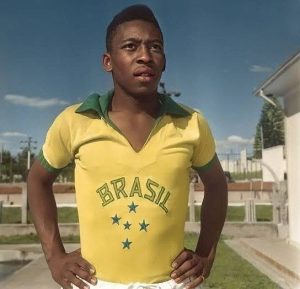
Pelé began his career at the age of 15 for Brazilian club Santos FC and quickly dazzled the footballing world with his timing, accuracy, speed, dribbling and agility.
The former striker for Santos football club, Major League Soccer (MLS) club New York Cosmos and the Brazilian national team has not been keeping well for some time. He had a tumour removed from his colon in September 2021, and was in and out of hospital for regular check-ups.
The outpouring of love and support for Pelé is not surprising. He is the one credited by FIFA for coining the term ‘The Beautiful Game’ for football.
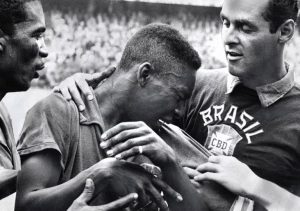
And back in 1961, when he was still around 21 years old, the government of Brazilian President Janio Quadros declared him an ‘official national treasure’ to prevent European clubs from taking him away from the country. And, then there was the historic event from 1969 when the two factions of Nigerian civil-war agreed to a 48-hour cease-fire only to watch Pelé play when he was visiting Nigeria with Santos.
That, in a way, shows how much valued O Rei has always been from the very beginning of his career.
Only Player To Have Won The FIFA World Cup Championship Three Times
Pelé won the FIFA World Cup titles three times — back-to-back in 1958 and 1962, and then for the last time in 1970. The 1958 win was the first FIFA World Cup for Brazil — the most successful nation at the grandest stage of football with five wins.
No one in history has ever won the World Cup title as many times as a player as him. As such, it is one of Pelé’s many Guinness World Records.
In all, 21 players including Pelé have won the tournament more than once. While 16 of them are Brazilians, there are four Italians and one Argentine in that coveted list.
Santos’ All-Time Top Goalscorer And Brazil’s Highest International Goalscorer
Pelé scored 643 ‘official’ goals in at least 659 games for Santos — the club he played for close to two decades of his career from 1956 to 1974. Technically, that figure translates to almost one goal per match.
No one has since scored as many goals as Pelé for the Brazilian club. He won Campeonato Brasileiro Série A (Brasileirão, as it is better known), two Copa Libertadores and two Intercontinental Cup trophies with Santos.
The 643-figure also made Pelé the holder of the record for the highest goalscorer for a single club in football history for 46 years till 22 December 2020, when Argentine great Lionel Messi surpassed it with his 644th goal while playing for La Liga club Barcelona.
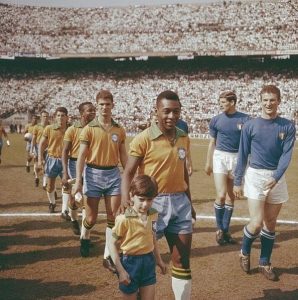
Pelé is still the record holder for most goals scored by a Brazilian for the Brazil national team, with 77 goals from 92 appearances.
Youngest Ever To Score At FIFA World Cup And The Youngest World Cup Champion
Pelé was only 17 years and 239 days old when he got his first FIFA World Cup goal during Brazil’s quarter-final match against Wales in the 1958 edition of the tournament in Sweden. He is thus the youngest ever to score in a World Cup tournament.
Ten days later, on 28 June 1958, Pelé’s heroics led to Brazil’s victory against Sweden in the final. As such, he became the youngest ever World Cup winner at the age of 17 years and 249 days — an unbroken Guinness World Record.
Youngest To Score A Hat-Trick And Youngest Ever To Score In FIFA World Cup Final
The 1958 edition indeed brought the world’s attention to Pelé.
Apart from the other records, he also became the youngest ever to score a hat-trick in the World Cup tournaments at the age of 17 years and 244 days. His treble came against France in the semi-final match on 24 June. All three goals came in the second half and Brazil knocked out France 5-2.
Pelé followed up his sensational performance in the semi-final with a brace against Sweden in the final match. His appearance in the match alone made him the youngest ever player in a FIFA World Cup final. And his goals made him the youngest ever to score in a FIFA World Cup final.
All the records stand to date. Interestingly, Pelé is also the only player in the world to score in a World Cup before turning 18.
Most career goals
Pelé is recognised by both the Guinness World Records and FIFA as the player with the highest goals in a career. But there is no agreement on the exact figure.
According to Guinness’ documentation Pelé scored 1,279 goals in 1,363 games, including the ones that came in friendly matches, amateur level at club, reserve team level and junior national games.
FIFA and South American football confederation CONMEBOL agree that he scored 1,281 goals in as many games. Santos club historian Odir Cunha had in March 2021 told ESPN that Pelé scored 1,282 goals in his career.
But Pelé himself claims to have scored 1,283 goals in his career. In fact, he had put this out in a tweet in 2015.
No matter the exact career figure, FIFA recognises Pelé as the only player to reach 25 international goals while still a teenager. And The King did that in just 20 appearances.
Most Assists Of All-Time In World Cup
Pelé was not just a prolific striker but also a brilliant tactician on the field. He had the eye to find his team-mates in the most perfect of positions for a score, and he deftly passed or crossed the ball over to them whenever such an opportunity arose.
The King scored 10 assists in the three World Cups — a record that stands to this day. He also holds the record for most assists in a single World Cup, which came in the 1970 edition of the tournament in Mexico. Pelé had six assists apart from the four goals he scored himself.
One of his 10 assists came in the final match of the 1958 tournament while two others came in the final of the 1970 tournament. As such, he is the record holder for most assists in World Cup finals with 3.
Over 100 Goals In Two Calendar Years
FIFA has recognised Pelé as having scored 127 in a calendar year in 1959 and 110 goals in 1961. The official Twitter handle of the governing body had on 13 July 2022 put out a tweet acknowledging the 127 goals mark.
It is not clear if this makes Pelé the record holder for most goals scored in a calendar year. Guinness World Records recognises Messi as the holder of the record for scoring 91 goals in 2012. The same year, Zambian Football Association also claimed that its star, Godfrey Chitalu, scored 107 goals for club and country in 1972.
Following the debate, FIFA spokesman Alex Stone had then told BBC Sport that “it’s not an official Fifa record” as the governing body does not keep domestic records. As such, neither Messi nor Chitalu are recognised as the holders of the record for a calendar year by FIFA.
A Recipient Of Numerous Honours
Pelé received several national and international honours including the International Peace Award in 1978, and an honorary Knight Commander of the Order of the British Empire in 1997 for his work as a UNICEF goodwill ambassador.
He was also named the co-winner of the Player of the Century award by FIFA in 2000, alongside Argentine great Diego Maradona.
Pelé was also honoured with an Olympic order — the highest honour given by the International Olympics Committee (IOC) — in 2016 at Pelé museum in Santos.
Yet many wonder why he never won the Ballon d’Or — football’s most important individual honour. The answer is because the Ballon d’Or was not awarded to non-European players till 1995. Moreover, no non-European player playing outside of Europe was eligible for Ballon d’Or till 2007 — the year its organiser, France Football magazine, opened the award to every footballer anywhere in the world.
As such, neither Pelé nor Maradona could ever win the award. Pelé was, however, awarded the inaugural
FIFA Ballon d’Or Prix d’Honneur (honorary award) in 2013.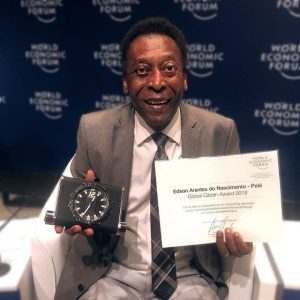
He also received the inaugural Laureus Lifetime Achievement Award in 2000 and was one of the only three sportspersons — along with Muhammad Ali and Jackie Robinson — to feature in TIME magazine’s ‘The Most Important People of the Century’ list in 1999.


